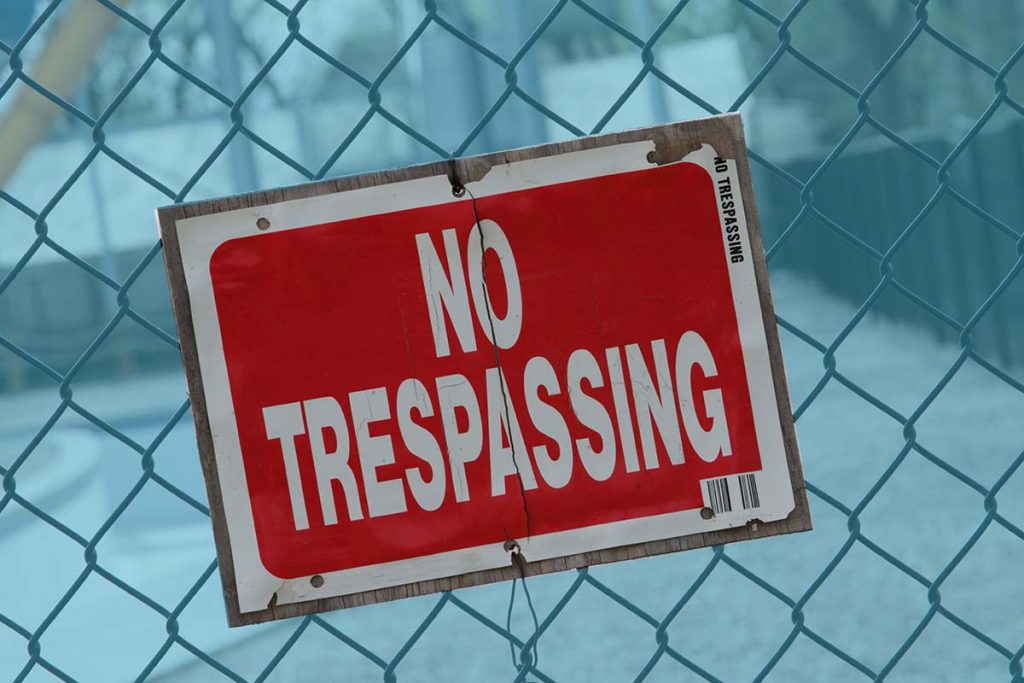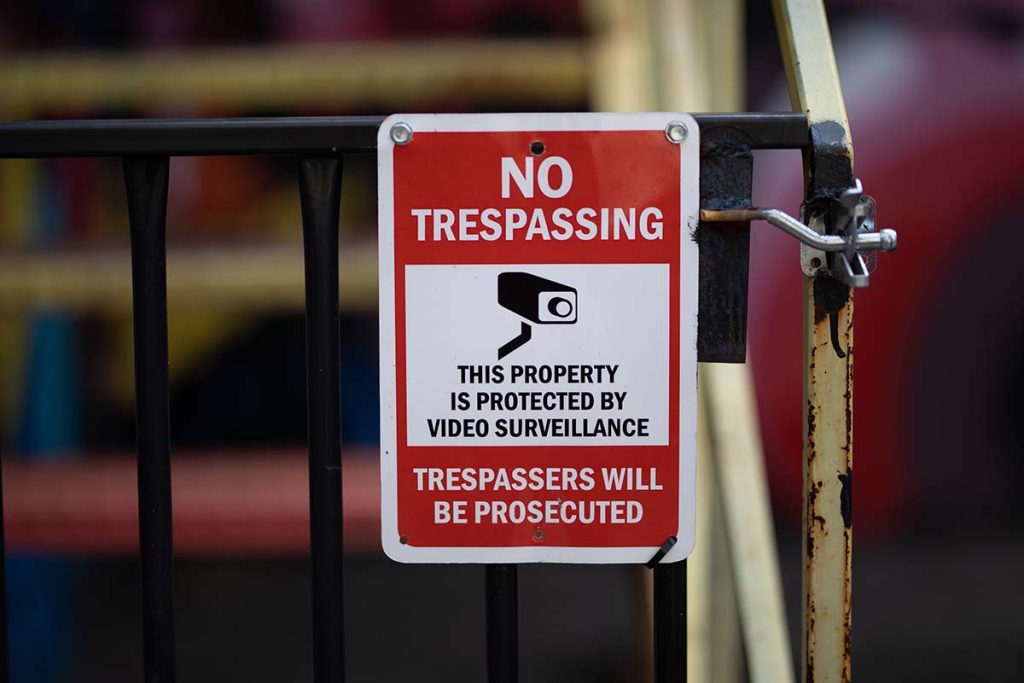If someone enters your property without permission, you may ask them to leave, call the police, and if the person poses an immediate threat to you or your family, you have the right to protect yourself, family, and property -even if it means using lethal force in some castle doctrine states including California.
Quick take: What is trespassing?
- To prove criminal trespassing, you must show that the accused illegally (negligently/intentionally) entered your land/property, the property belongs to you, and you did not consent to the entry.
- Some states require you to prove that the trespasser caused damages.
- The accused must have ‘intent to enter.’
- Under the castle doctrine, you have the right to use a “reasonable response” when protecting yourself or your property.
- You cannot use lethal force to defend property in some states.
- Adverse possession may allow trespassers to gain legal ownership of your land or property.
- A no trespassing sign is the best protection against adverse possession.
- Only government officials may restrict access to public property.
- On private land, it is up to the property owner to decide who gets in and who does not.
How to charge someone with trespassing
When you enter private property without permission from the owner, you violate your state’s criminal trespass laws. Consequently, the property owner has the right to ask you to leave, call the police if you refuse to leave, and if you pose an immediate danger to the land or property owner, “stand your ground laws” allow property owners to defend themselves in some states.
Note – ‘Stand your ground’ should be a last resort as confronting a trespasser may put you in additional danger.
Ideally, if you are in a position to do so, the first steps you should take would be to report the trespasser to the police or sheriff’s department. When reporting someone, you should take specific notes of anything law enforcement may be able to use to identify the trespasser.
This includes notes such as:
- Height
- Gender
- Race
- Weight
- Clothing
- Car (Make, Model, and Licence Plate)
- Personal information you may have about the trespasser (name or address)
After you have created a police report, if you are the property owner, you should receive some ongoing information from the police, such as a no-trespass citation and additional information about the case. The trespasser may appeal, get fined, receive a trespass warning, or even receive a jail sentence in more extreme cases.
For example, if you are in Florida, state statute 776.013 “home protection; use or threatened used of deadly force; presumption of fear, death or great bodily harm,” allows you to use non-deadly or deadly force against a person who enters your property without permission.
The statute reads in part, quote:
“A person who is in a dwelling or residence in which the person has a right to be -has no duty to retreat and has the right to stand his or her ground and use or threaten to use: (a) Non-deadly force against another when and to the extent that the person reasonably believes that such conduct is necessary to defend himself or herself or another against the other’s imminent use of unlawful force; or (b) Deadly force if he or she reasonably believes that using or threatening to use such force is necessary to prevent imminent death or great bodily harm to himself or herself or another or to prevent the imminent commission of a forcible felony.”
What is legally considered trespass?

The definition of trespass varies depending on state law; however, the elements of the crime are similar. That means you are guilty of criminal trespass if you intentionally enter another person’s property without permission and remain there.
What is the difference between criminal and non-criminal trespass?
Non-criminal trespass happens when you enter someone else’s land or property accidentally. On the other hand, you are guilty of criminal trespass if you had intent or knew that you do not have permission to be on the land. For example, if you ignore a No Trespass sign, you are guilty of criminal trespass.
What is the point of no trespass signs?

In most states, to accuse someone of trespass, there must be a No-Trespass sign on a conspicuous section of the land or property. Another option is to fence the property or lock the doors. Because of that, to enter your property, an individual must make an effort, such as jumping over a fence or breaking down the door (Criminal acts).
It is also worth noting that entering someone else’s vehicle without permission constitutes trespassing.
In short, if you intend to pursue criminal charges against someone for trespass, you must make sure that:
- The accused entered your property or land using free will or on purpose. If the trespass was accidental, you should ask the individual to leave.
- You must reasonably inform the trespasser that he is on private property. Put up a sign, build a wall, or lock the doors.
- The individual must have intent, such as to commit a crime, damage property, spy, and so on.
Can you be guilty of trespass in public spaces?
Yes. If you enter a restricted area, or if someone with authority asks you to leave, and you ignore the request. You may face trespass charges. It is also worth mentioning that you may also face trespass charges if you break into a vending machine.
Under the US Constitution, you have the right to access public property, but that right is not absolute.
In short, what you need to remember is:
- You do not have the legal right to enter private property without the owner’s permission.
- Consent to enter private property must come from the property owner, the lessee if you want to enter a leased property, a business entity, or a group of owners.
- Consent to enter could be verbal or in writing.
- Implied consent can be hard to defend. We recommend getting verbal or written consent.
That raises the question:
What are the three types of trespass?

There are three types of trespass, as explained below.
1. What is meant by a ‘Trespass to the Person’?
If you intentionally interfere with someone else’s body or liberty, you are guilty of trespass to the person. Examples of ‘trespass to person’ in the US include:
- Assault
- Battery
- False imprisonment.
If you are a victim of false imprisonment, battery, or assault, you have the right to take civil action, and at the time of the crime, you have the right to protect yourself.
2. What is meant by trespass to chattels?
Trespass to chattels refers to the unauthorized use of property without consent from the property owner. To prove it, you must show that the accused dispossessed you of your property, the property/chattel’s condition, quality, or the value was impaired, the accused possessed or used the item for a substantial time, and that harm to person or item occurred.
In other words, if someone uses your property without permission and damages it, you have the right to file a claim.
What to remember
- ‘Mistake of ownership’ is not a valid defense in a chattel claim.
- The term Chattel refers to personal possessions, this can be any example of a personal possession. Examples of chattels include ATV’s, Motorbikes, Laptops, etc.
- In a chattel claim, you do not need to show ‘Intention of Harm’ to a person.
- The use of the item must be unauthorized or unlawful.
3. What is meant by Trespass of land?
As mentioned, the trespass of land occurs when you enter someone else’s property without permission. For example, Alabama code section 13A-7-2 “criminal trespass in the first degree defines trespass as:
“A person is guilty of criminal trespass in the first degree if he knowingly enters or remains unlawfully in a dwelling.”
Trespass of land can be land or property.
How do I remove a trespasser from my property?
If you fear for your safety, the first thing you should do is contact the police. To make it easier for the police to find the trespasser. You should describe the clothes the individual is wearing to the police, and the person’s height, weight, race, or other identifying information.
Do you have the authority to restrict access to property?
Before you ask someone to leave, it is vital to ensure that you have the authority. For example, in a private building, only the property owner has the authority to restrict access, whereas, in public spaces, only government officials may restrict access to certain areas.
Can you defend yourself against a trespasser?
Yes. If the trespasser is an immediate threat to your person or someone else on your property, the law allows you to protect yourself. However, in most states, the law allows you to use a reasonable response when defending yourself or your property.
For example, Florida’s Castle Doctrine allows you to use lethal force only if the trespasser attempts to enter your home or property forcibly.
Can I forcibly remove a trespasser?
“Reasonable force” under state law means that you may use force that is objectively reasonable under the circumstances you find yourself in.
Therefore, if the situation makes it necessary to remove the trespasser using force, then you may use force to remove the trespasser.
It is best to consult your state laws to see if you are a ‘castle doctrine’ or if there are criminal penalties for defending your land.
Castle Doctrine State Overview
If you find yourself in trouble after defending your property, it is best to consult with an experienced criminal defense attorney.
Follow this link to find out more about justifiable homicides.
What are your rights against trespassers?
In the US:
- You have the right to privacy.
- You may do what is reasonably necessary to protect yourself and your family.
- When acting in self-defense, your reaction should be proportional to the attack.
- If you attack a non-criminal trespasser without provocation, you risk a civil lawsuit and assault charges.
Can property owners sue trespassers?
Yes. If someone enters your property without consent and causes damage, you have the legal right to take civil action.
What is adverse possession of land or property?
In some states, a trespasser may occupy your land and gain ownership of it over time. The reason for that is the Adverse Possession Doctrine or Squatter’s Rights.
How does it work?
- Someone may intentionally or intentionally come on your land and start living on it.
- The trespasser makes improvements on the land, such as planting a garden or building a structure.
- The trespasser possesses the property for a continuous period. Can be anywhere from seven years or twenty years, depending on state law.
How do you prevent adverse possession?
If someone illegally occupies your land or property, what you should do is call the police. You may also use reasonable force to remove the individual.
What if the person has built a structure or made an improvement to your land?
If you allow the trespasser to stay on your land for too long, or if the individual develops the property, you may need a court order to kick the individual out.
That said.
The best protection you have against adverse possession is installing trespass warnings in the form of trespassing signs on your land or giving written permission to anyone who frequently uses it. For example, if a neighbour frequently parks his vehicle on your property, make sure that the individual has written consent from you to do that.
What are the penalties for trespassing?
The criminal charges for being caught trespassing can vary significantly. These range from being let off with a warning, to fines, or even jail time, depending on the severity of the trespass.
What are the defenses to trespass to land?
If the property owner brings charges against you, some defenses you may use include:
- Consent. Written consent works best.
- Public or private necessity.
The best defense depends on the facts of the case, so we recommend consulting with a criminal defense attorney immediately.